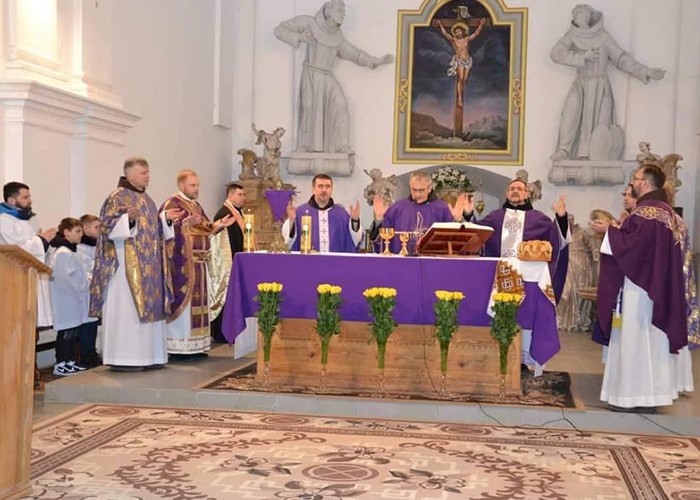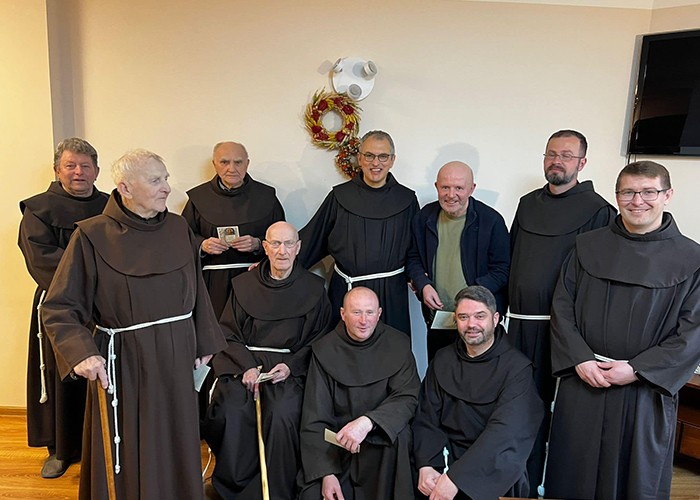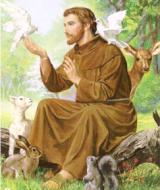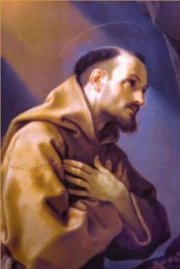

From 10 to 16 April 2022, the Minister General, Br Massimo Fusarelli, accompanied by Br Francesco Piloni, Provincial of Assisi, visited Romania, Ukraine and Poland. Following this visit, he shared his pilgrimage with the Communication Office of the Order.
Minister, where did your journey begin?
We arrived on Palm Sunday in Romania, at Suceava, on the border with Ukraine. We had to wait until the next day to enter, so we took the opportunity to greet the friars of Transylvania, to visit a Marian shrine and be with the Provincial and the friars of the fraternity. Then finally, we entered Ukraine. Crossing the border between Romania and Ukraine was like a mirror because it showed us a daily flow of people: there are refugees returning to Ukraine – especially women, children, the elderly – and people leaving the country. Between Poland and Ukraine, up to last week, between 25 and 30,000 people a day were making this crossing. That’s a lot, and it also shows us one of the consequences of the war: the displacement of people. We saw people leaving the country with few suitcases and few possessions. Very sad, but it really touched our hearts. We were also able to talk to some of them. On 11 April, at the border with Ukraine, we met with other representatives of an interreligious pilgrimage, the central moment of which would be the meeting the following day.
Participation in this inter-religious pilgrimage was another important reason for your trip.
Yes, there I had the opportunity to get to know the different participants in this pilgrimage: the Archbishop Emeritus of Canterbury of the Anglicans, Rowan Williams, the Greek Orthodox Metropolitan Archbishop of the Patriarchate of Constantinople in England, but also a Ukrainian Bishop of the Orthodox Church of Kyiv and then representatives of the Islamic world (former Grand Mufti of Bosnia), representatives of Judaism, Hindus and Buddhists. We were twelve in all, and we shared in the preparation for the meeting the following day.
On the morning of 12 April, divided into three small groups, we visited the refugee centre and an orphanage. I think this was the most painful and hardest part of my pilgrimage. There were 200 children and young people in this centre, about 80 of whom were orphaned or abandoned because their parents had been dispersed by the war. Some of them suffered psychological violence and various forms of abuse. I confess that I cried when I left. I also asked the Lord: “Lord, help me, Lord, manifest yourself. Make yourself known, because the suffering of children is terrible”. But I must say that along with this suffering, apart from the despondent teenagers seen in other refugee centres, I found the joy and celebration of the children. A feature of the trip visiting the refugees was always this: pain and hope, weeping and laughter together. It made me think that this is what Easter is really like: death and life.
In the afternoon, there was the inter-religious meeting, the central point of the pilgrimage, which was very intense. The theatre was full of people: it was the first public event since the beginning of the war in Ukraine. So it was also an important and beautiful moment of sharing.
In the Holy Father’s letter, which was read on 12 April in Černivci, the Pope writes: “The suffering caused to so many weak and defenceless people; the numerous civilians massacred and the young, innocent victims; the desperate flight of women and children… All this shakes our consciences and obliges us not to remain silent, not to remain indifferent in the face of the violence of Cain and the cry of Abel, but to raise our voices forcefully to demand, in the name of God, an end to such abominable actions. You spoke of St Francis of Assisi during the prayer. How can we raise our voices today?
The Pope is raising his voice. He speaks out a lot against the war, like no other leader. But for some, this is not enough because would like the Pope to take a stand. Raising one’s voice, however, is not just a matter of pointing out a guilty party: it is a matter of denouncing the iniquity of war, of not remaining neutral, of saying that war today can degenerate into a nuclear conflict. No war can be called just, even if people have the right to self-defence. So to raise my voice seems to me to be doing what the Pope is doing. I, too, by going there, wanted to tell the friars and all Christians that we are there; we are not indifferent to what is happening.
Does raising your voice at the international political level mean taking a clearer position? Definitely. Does it mean asking if you really want this war to end? Since many people in Ukraine are asking this question. Or does this situation ultimately suit some people? Here we enter into very delicate and very sensitive subjects.
How are the Friars Minor of the communities you visited, and how are they coping with this situation?
I met the friars in different houses. In each friary, I also met refugees: people who had fled from the east of the country. I must say that five days after my trip, bombs fell in the place where we passed through Lviv and 7 civilians died. So today, we know that no area is safe in Ukraine because war suddenly affects everyone.
In the West of the country, I had the most significant meeting with the people of our churches and with local administrators. I saw so much solidarity and involvement, which gave me so much hope.
To date, none of our friars have been physically affected, and neither have the friaries. The friars are with the people: it is their vocation that they are truly living. Indeed, during my visit, I also saw the friars’ wounds, the tension, the fear. They have their families and loved ones under bombardment. They feel, like everyone else, a sense of insecurity, and so they also need support. They were happy with my visit because it brought them out of a sense of oppression, of closure. From the friars of the Order they are receiving a lot of material solidarity and closeness through a phone call, an e-mail. This makes them feel part of a bigger family, which is very important.
What do the people you met need?
For the moment, the friars are receiving, thanks be to God, what they need for the people. Although a lot of aid is coming in from many parts of the world, the money that is being collected will be beneficial when the war comes to an end. It will be necessary to rebuild and help people return to their homes. Many people in Europe, in Italy, Germany and Poland, are helping with generosity. I have seen the warehouses with food, medicines, and items for the elderly, the sick and children.
Minister, what message would you leave for the friars and the world after your pilgrimage?
The message is what the Pope said: let us not remain indifferent. We get used to war. We feel that such a war is a wound for everyone. There is an aggressor, and there are the attacked. But we know that we carry within us the seed of violence that can explode at any moment. So we have to be very careful about this. We want peace; let’s not fuel this war. To be for or against someone was not our vocation, especially as friars, as Christians. And we work for reconciliation, peace. We must help people to overcome the wounds of this war.
What does it mean to talk about peace today?
Something has changed profoundly: Europe and the entire world are no longer what they were before the war. Then, we were in an illusion, in a somewhat artificial peace. Today we see that peace is very fragile and that a more significant commitment is needed to safeguard and promote it. As a believer, as a Christian, I would say: what does God’s Providence want us to see through this war? I see it as a great call to conversion, a great call to rediscover faith and a deep understanding of the heart of life. In asking us to consecrate ourselves to the Virgin Mary, I believe that the Pope wanted to indicate this understanding. War is a word for our conversion. I, personally, felt this aspect very much on this pilgrimage.
The friars invited me to go to the eastern part of Ukraine. So as soon as possible, I will go to continue this journey, this pilgrimage.




|
Date |
Name of the Friars |
Events |
Year |
|
01 |
Charles Mathew Kolanchery |
Birth |
1947 |
|
02 |
Joseph Raj M. |
Birth |
1975 |
| 03 | Bl. Helene Enselmini, OSC | 1242 |
|
|
04 |
St. Charles Borromeo, OFS Bl. Teresa Manganiello, OFS Charles Bernard |
Birth |
1584 1876 1963 |
|
05 |
Lawrence Simon Bala Marneni + Thomas Thannikary + Bernard D’ Silva |
Birth Birth Home Home |
1949 1962 1996 2010 |
|
06 |
Bl. Marguerite deLorraine, OSC Singarayar A. Salvador D’Souza |
Birth Birth |
1521 1970 1979 |
|
07 |
St. Didacus of Alcala, OFM Bl. Raynier of Arezzo, OFM Hemant Xess |
Birth |
1463 304 1975 |
| 08 | Bl. John Duns Scouts OFM | 1308; |
|
|
09 |
Bl. Gabriel Ferreti, OFM Saji P. Mathew |
Birth |
1456 1975 |
|
10 |
Bl. Louis Guanella, OFS Augustine Pinto + Wilbert Smit |
Birth Home |
1340 1936 2003 |
|
11 |
Bl. Mary Crucifixa, OFS Fulgence Ekka Basil S. Lobo |
Birth Birth |
1826 1964 1971 |
| 12 | Bl. Giovanni della Pace, OFS | 1433 |
|
| 13 | St. Didace d’ Alcala, OFM | 1463 |
|
|
14 |
Franciscan Martyrs of Palestine + Mark O’Rourke Salvador Drego |
Home Birth |
1391 1974 1984 |
|
15 |
Bl. Sebastian de Jesus OFM Bl. Mary of the Passion FMM + Anthony Almeida |
Memoria Home |
1734 1904 1970 |
|
17 |
St. Elizabeth of Hungary Patroness of the OFS Bl. Jeanne de Signa, OFS |
|
1231 1307 |
|
18 |
Bl. Salome of Cracow, OFS |
|
1268 |
|
19 |
St. Agnes of Assisi, OSC Bl. Maria Milagros, OSC Thomas Joseph +Kamal Ekka |
Birth Home |
1253 1936 1962 2008 |
|
20 |
Franciscan Martyrs of Spain Irudayaraj Fernando + Bonaventure Davis + Bishop Ambrose Y +Jesu Irudayam |
Birth Home Home Home |
1936 1966 1971 1997 2009 |
|
22 |
Franciscan Martyrs of Armenia +Joachim Tinneny |
|
1895 2009 |
|
23 |
Bl. Marie de Jesus, Third Order Regular + John C. O’Dowda Maria Ratheesh Jenive |
Home Birth |
1902 1982 1999 |
|
24 |
Bl. Timothy Trajonowski, Conv Rajesh Praveen Kumar |
Birth |
1942 1994 |
|
25 |
All Deceased of the Seraphic Order St. Humilis of Bisgnano, OFM Bl. Elizabeth of Reute, Third Order Regular Carlos Dias Tojy M. |
Birth Birth |
1637 1420 1959 1970 |
|
26 |
St. Leonard of Port Maurice, OFM Balthazar Pinto |
Feast Birth |
1751 1960 |
|
27 |
St. Francis Anthony Fasani, Conv Johnson M. V. |
Feast Birth |
1742 1969 |
| 28 | St. Jams of La Marca, OFM | Feast | 1476 |
|
29 |
All Saints of the Seraphic Order Dependent Custody Foundation,North East. Amaladass Manickam |
Feast Erection Ordination |
2008 1985 |
|
30 |
Bl. Antoine Bonfandini, OFM Prasad Papabathuni |
Birth |
1482 1970 |